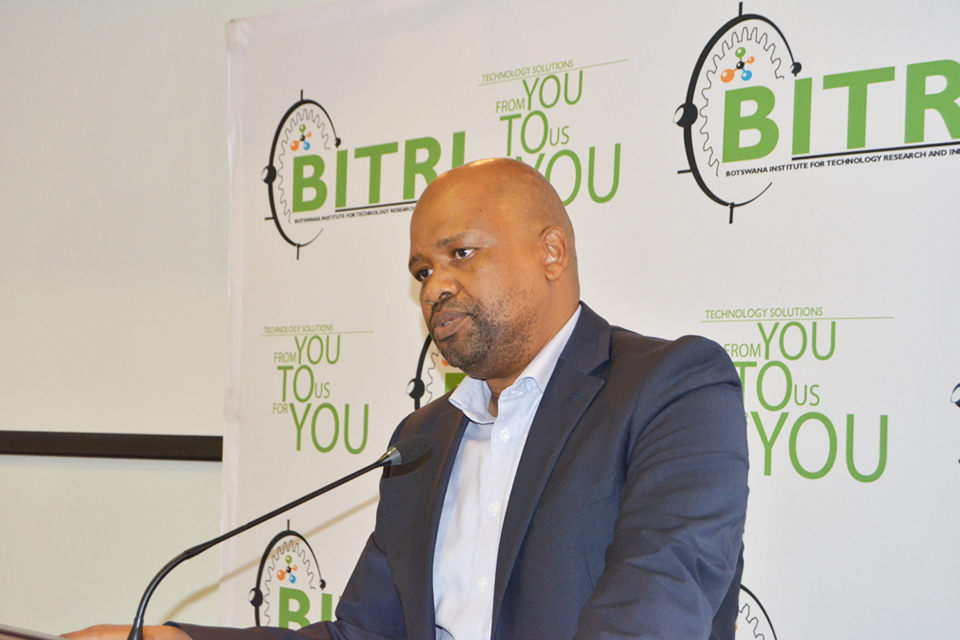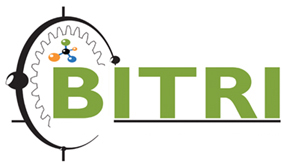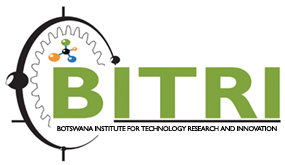November 25, 2019


On Wednesday 20th November, Botswana Institute for Technology Research and Innovation (BITRI) hosted the media for the annual media brief at Maranyane House. BITRI Chief Executive Officer Professor Shedden Masupe gave an introduction and mandate of BITRI, the research focus areas, and an update on key projects under the focus areas. Prof Masupe explained that BITRI conducted its mid- term strategy review in February 2019 with an objective to take into cognizance the changes within the political, social, economic and technological environments within which BITRI exists since the formation of its first strategy in 2016, evaluate resource needs, amongst them human capital as well as corporate performance.
Prof Masupe also appraised the media on the Kgalagadi Sand Building Block/Brick technology project, which BITRI is envisaged to set up twenty-nine (29) depots across the country by the end of the rollout phase. The CEO shared that the technology has been patented and that BITRI has licensed Kago Phepa Pty Ltd, a local company, to manufacture the KSBB blend and supply the depots.
“BITRI has come up with a technology for the manufacture of quality & affordable blocks/bricks using Kgalagadi sand as the aggregate & KSBB-specific cement blend as a binder. The KSBB Technology is patented & currently being rolled out throughout Botswana. To date there are five operational KSBB depots in Maubelo, Kasane, Lehututu, Phitshane-Molopo, and Takatokwane. An additional five are under construction and anticipated to be completed by end of this year at Artesia, Charles Hill, Ghanzi, Gumare & Maun,” Prof Masupe elaborated.
Another project still under the Building Material Science division, is the investigation of the potential of local raw materials to produce portland cement clinker being done in collaboration with Botswana Geoscience Institute (BGI). The audience was informed that prospecting, sampling, qualitative & quantitative analysis of limestone and/ or calcrete deposits is on-going, and that prototyping clinker production will be informed by the fitness for purpose of the resources investigated with respect to quality and quantity.
Professor Masupe also made reference to declarations made by His Excellency Dr. Mokgweetsi Masisi during the recent State of Nation Address regarding the status of industrial masks being developed under the Nanomaterials division. The dust masks, made from nanofibers have shown to have a Viral Filtration Efficiency (VFE) of over 99.9%, translating that the mask can filter out over 99.9% of viruses, therefore, opening doors for BITRI to expand its masks development to include protective health and medical masks to prevent viral infections, and deployment during outbreaks of epidemics.
“BITRI is also working on three main types of water filters; nylon nanofibre, ceramic and carbon-based filters for water purification. Filter cartridge made from Morupule Coal has been shown to remove odour from water; filter cartridge made from fly-ash has been shown to remove arsenic from water; and ceramic-based water filters developed at BITRI performed well in the lab, removing100% bacteria from water contaminated water,” explained Prof Masupe.
Prof Masupe updated on the various laboratories and facilities at BITRI such as the Centre for Materials Science (CMS), the Building Materials Testing laboratory, the 3D Printing (Additive Manufacturing) laboratory still under construction, as well as the Solar Thermal Testing Facility (STTF). In April 2019 The BMS Testing facility attained accreditation under the revised version of ISO/IEC 17025 international standard from Southern African Development Community Accreditation Services (SADCAS) in the in the scopes of Civil Engineering and Mechanical Engineering.
“The BITRI Building Materials Testing laboratory targets the Civil, Mechanical Engineering & Construction industries in Botswana & the SADC Region. It [the laboratory] has been accredited for two testing methods: Civil Engineering for Compressive Strength testing, and Mechanical Engineering for Tensile Strength testing. In addition, the laboratory has the competence to carry out Concrete Testing, Aggregate Testing, Cement Testing and Metal Testing,” Prof Masupe explained.
“BITRI is also in the process of attaining accreditation for the CMS facilities with the SADCAS. Currently most of the testing jobs done by the mining, water distribution and built environment enterprises are done in South Africa. So, we are hopeful of benefiting from those transactions once our labs are accredited,” enthused Prof Masupe.
Prof Masupe also spoke on the Climate Smart Agriculture Lessons Learnt manual developed as a result of a partnership of BITRI with the Ministry of Agricultural Development and Food Security and the United Nations Development Programme (UNDP) Botswana. The manual developed in conjunction with farmers, aims to the use of climate smart technologies to increase productivity and farmers’ resilience, and has already borne fruit in the test areas, with more small-scale farmers adopting the manual based on experiences of their contemporaries. BITRI was said to also be the lead author in the drafting of Botswana Drought Management Strategy, which the final draft of which will be used as the principal strategy to guide the Government of Botswana interventions regarding drought management.
Under the Technologies broad thematic area, the CEO updated on the Sign Coach application aimed at bridging the gap between the hearing and non-hearing by teaching Botswana sign language in 3 levels from beginner up to advanced level. The application was developed in partnership with the Botswana Society for the Deaf (BSD) and serves to share information on among others, HIV/AIDS, non-communicable diseases (NCDs), sexually transmitted diseases, drug abuse, circumcision and pregnancy. The other significant project is the Kwibi, a wildlife mobile application used for online sightings, posting location finder, and recordal of incidents, analysis and reporting for which BITRI and a local company, Fox Croft Pty Ltd, entered into a Computer Software License Agreement for the application earlier in November. The other projects are the Nthusa Distress Call software suite used by the public to send distress messages to police, emergency, and fire services to request for assistance, the Fleet Management System that keeps track of a vehicle’s life cycle, produces reports, gate logs, trip calendar, inventory management, accident & process requests and performs other functions such as car Tracking, Geo-fencing, Speed limit & Ignition Status. The CEO reported that the installation of the Seding Solar street light is ongoing, with the lights functioning properly in test sites in Moshupa, Lobatse and Letlhakane. Regarding the Biogas project developed in collaboration between BITRI and UNDP, with the objective to facilitate low-carbon investments and public-private partnerships in the production and utilization of biogas from agro-waste, the CEO appraised the audience that the project is predominantly being adopted in the districts in South-eastern Botswana. At the time of reporting, twenty (26) digesters were said to have been built and operating in areas such as Moshupa, Kanye and Tlokweng, and a corresponding number of masons having been trained on small scale biogas digester construction, operation and maintenance.
The media brief concluded with a tour of the 3D laboratory led the BITRI Design Engineer, Shorn Molokwane. Mr. explained the advantages 3D has in comparison to the traditional manufacturing process, highlighting, the former’s capacity to enable direct manufacturing of complex geometries with ease, achieving therefore, a high degree of customization. This quality, Mr. Molokwane added, makes 3D printing ideally suited for patient-specific medical device applications, as well as combining of multiple parts and producing assemblies as single units. The laboratory currently does 3D printing using plastic, and will in near the future, install equipment that allows for application using metal. When expounding on real-life application and relevance of the technology, Mr. Molokwane cited the manufacturing of patient-specific implants such as the printing of mangled bones that conform to the bodies of recipients. The parts manufactured using the technology, can replace the original body parts and restore the quality of life of recipients.
In her Closing Remarks, the BITRI Director Research and Partnerships, Dr. Bathsheba Mbongwe, expressed gratitude towards the media and put into the context, the role of BITRI of achieving the strategic goals set by the Government of Botswana.
“In making the closing remarks, on behalf of the Board, the CEO and Management, we would like to sincerely thank the media for gracing this occasion. We regard the media as our bridge to access the public so that they are made aware of what is happening at BITRI. Innovation is the current and future currency of global competitiveness. For any nation to grow, and be competitive, it needs to be very innovative, and BITRI has begun strides in developing different technologies. And for us, innovation is not only about creating technologies; it is also about disseminating information and adapting or adopting existing technologies. And that is what we are doing today – disseminating information on what we are working on. I am saying this because when you look into our [Botswana] aspirations, as articulated in Vision 2036, it indicates that we would like to become a high-income country through an export-led economy. And one of the strategies that the country has adopted, is that we will achieve that high-income country status, though a knowledge-based economy, where research and innovation play a critical role. BITRI is already on that pathway to achieve the vision of our country. And when it comes to global rankings in relation to global competitiveness, the rankings will improve because of the work that is being done at BITRI. We really value our partnership with the media, that we have nurtured over the years. We believe that, for those who will ask what BITRI does, since there is general lack of understanding around science and technology matters, you [the media] will be our voice in conveying the message on what our organization does,” said Dr. Mbongwe.

